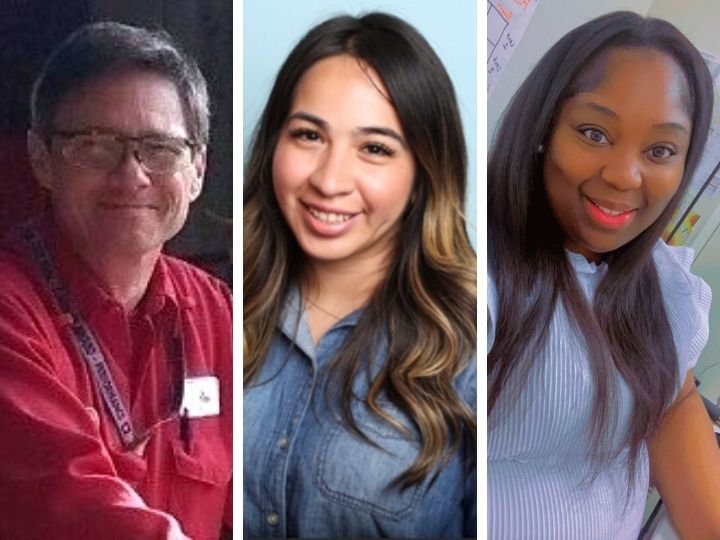

After three decades of working as an engineer, Rob Hope decided to return to the University of Houston to pursue his master’s degree in curriculum and instruction. He wants to teach high school math when he retires. Hope said he found the ideal graduate program at the UH College of Education — flexible, relevant and high quality.
“It’s going to sound cliché, but the professors really care about the students,” said Hope, who started the online program living in Houston and now takes classes from Washington, where he works as a project manager for Shell. “I like the flexibility, but at the same time I still have the name recognition of a brick-and-mortar institution.”
The online master’s degree programs at the UH College of Education have consistently ranked among the best nationwide. This year, the college has earned a No. 14 ranking on the U.S. News & World Report list of best online graduate education programs, according to results released Tuesday.
“At the University of Houston, we prioritize innovative instruction to elevate student learning, whether it takes place online or face to face,” said Paula Myrick Short, senior vice president for academic affairs and provost at UH.
UH’s strong performance in the ranking reflects a high graduation rate (95%); low class sizes (17 students on average); highly trained faculty; the use of varied technology; and helpful support services, including academic advising and career assistance.
The rankings cover the College of Education’s online M.Ed. programs in curriculum and instruction, higher education and special populations. The curriculum and instruction program offers online specializations in early childhood; math; reading and language arts; learning, design and technology; bilingual/ESL; and health science education. The special populations program includes online specializations in special education and gifted and talented.
UH also earned top spots on the 2022 U.S. News online education specialty lists, placing No. 14 in curriculum and instruction and No. 13 in educational administration and supervision.
“Our faculty continue to refine their online teaching practices so students remain engaged and graduate well prepared to be leaders in their field,” said Bob McPherson, dean of the College of Education.
Hope, who’s specializing in math education, said the assignments have helped him hone his research, technology and writing skills while giving him invaluable insights into being an effective teacher. He said a course on working with multilingual students was particularly helpful, and he’s continued using an online app introduced in class to learn Spanish.
“The workload is not overwhelming, but it is relevant,” he said, adding that he enjoyed the challenge in Assistant Professor Melissa Gallagher’s course on teaching proportions. “When you leave that class, you’re sweating a little bit, but you definitely come out of there with good information.”
Gallagher said she works hard to facilitate deep discussions in the online environment, typically splitting students into small groups using breakout rooms. Students can work collaboratively or individually on math problems using online workspaces, and the professor can pop in and provide feedback in real time. Including relationship-building activities is also important, Gallagher said, with students logging in from around the country.
“If there’s not trust, then the students are just going to turn off their video and hide,” she said. “One thing I think is really important about any graduate program is pushing students to think more deeply and reflect on what they’re learning. I’m trying to help them become leaders.”
Elizabeth Rodriguez, who graduated in December with a specialization in bilingual/English as a second language education, said the online format worked well with her busy schedule. She began the program as a bilingual classroom teacher at YES Prep charter school and now works as a literacy specialist there. Her online M.Ed. classes typically met one evening every other week, and she would have assignments in between.
Although she grew up bilingual, speaking English and Spanish, Rodriguez said she pursued her master’s in part to learn ESL strategies she realized she and fellow educators needed to better support students.
“I think an online program works really well with teachers’ hectic schedules,” she said. “We had moms with newborns, we had teachers, we had administrators. It allowed us to pursue a higher education.”
She said she appreciated that her professors broke the students into small groups and noted that the online chat function allowed classmates to celebrate each other or ask questions easily.
“Our professors, rather than just lecturing at us for three hours, they incorporated breakout rooms for us to work together and then we would present. They still made it really engaging,” she said.
LaRenda Watts, a math teacher in San Augustine ISD, about three hours north of Houston, said juggling the online M.Ed. program between teaching, sponsoring cheerleading and volunteering at church has been worth it.
“I’ve built relationships with professors, and I’ve never seen any of them in person. The professors are very flexible,” Watts said. “Every class had something that I could input instantly into my classroom.”
— By Ericka Mellon